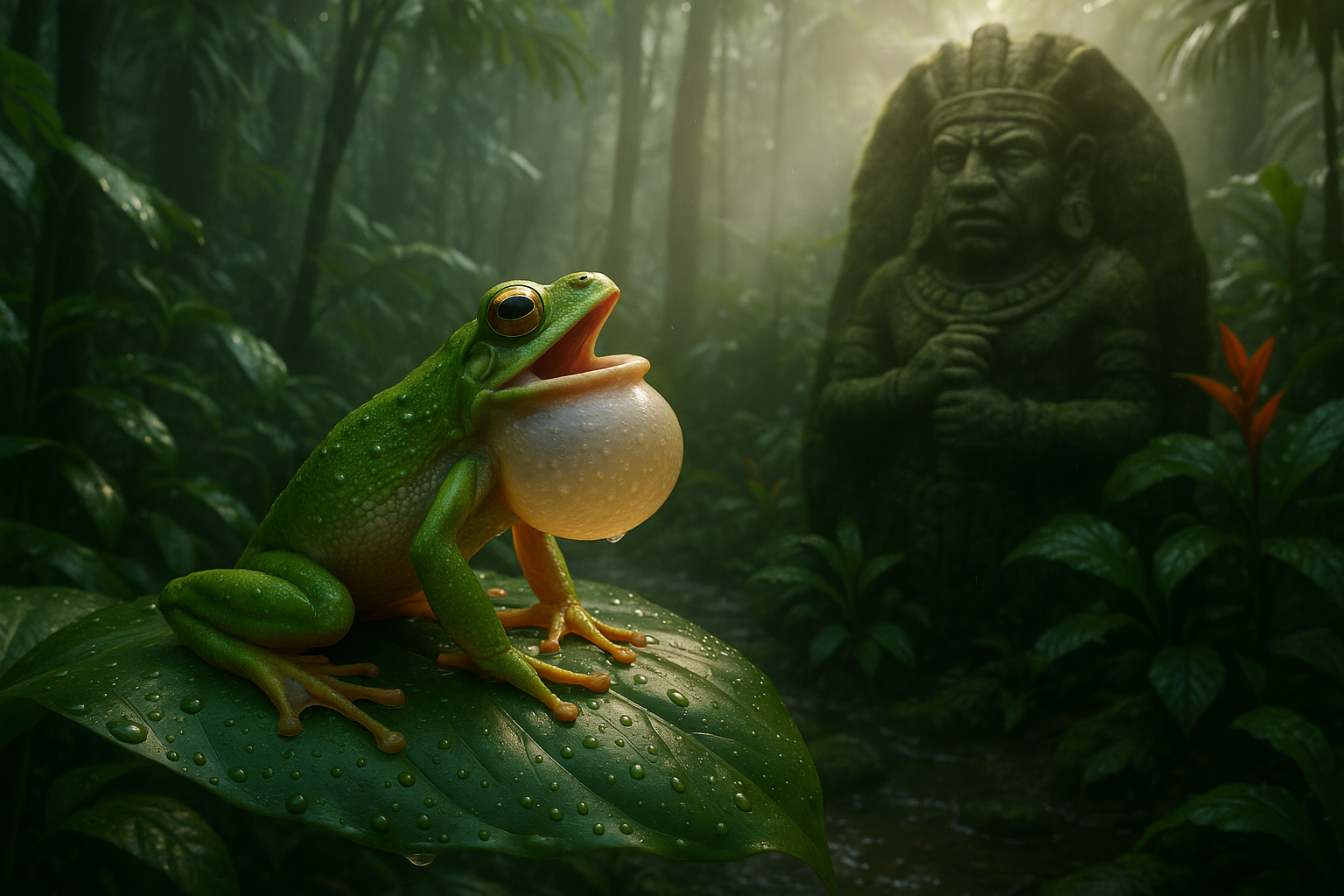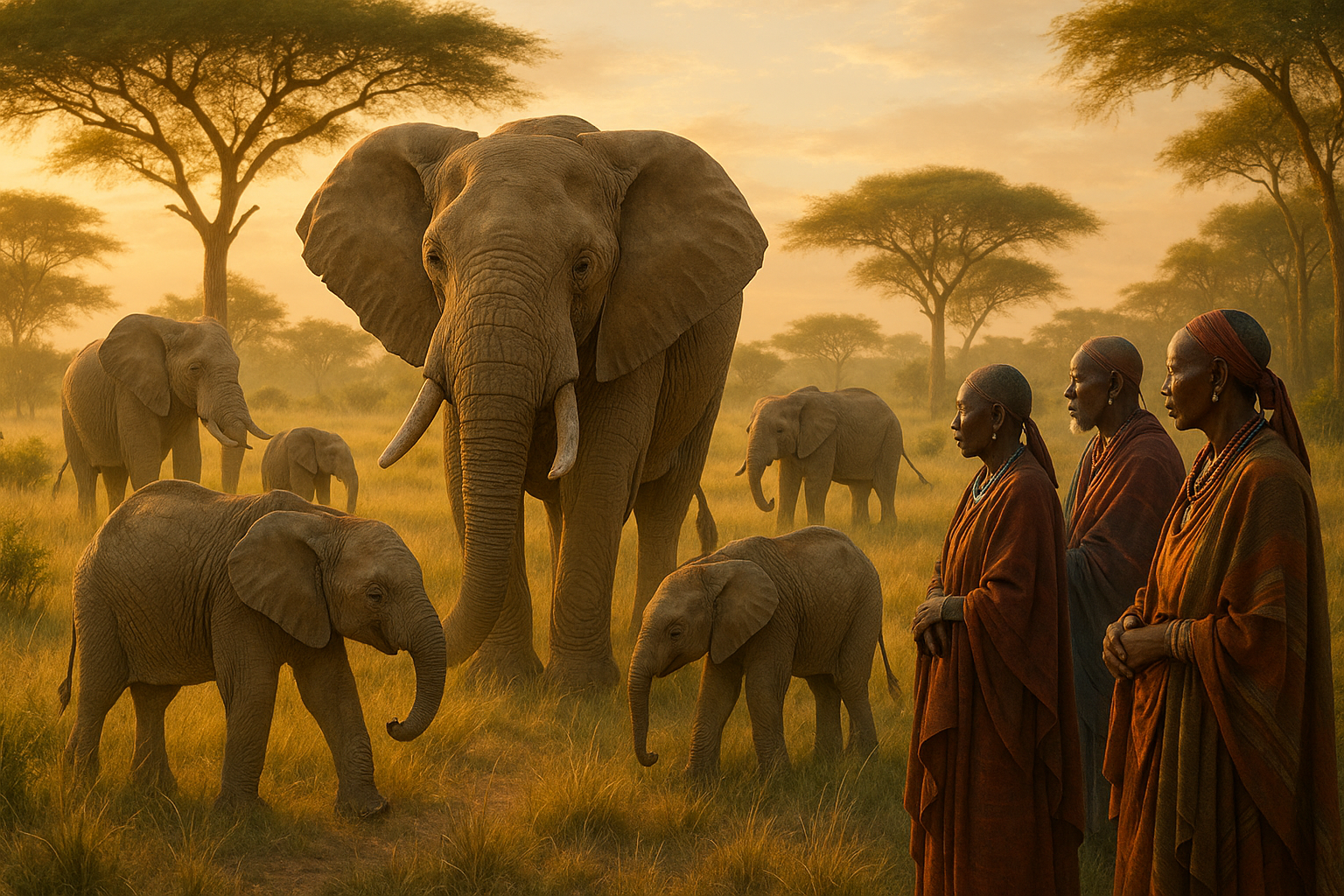Amidst the symphony of nature, there exists a peculiar yet fascinating connection that has captivated human curiosity for centuries: the enchanting call of frogs and its mystical ties to the rain gods. 🌧️ As the first drops of rain grace the earth, an orchestrated chorus of croaks and ribbits fills the air, creating an ambiance that feels both magical and ancient. But what is it about these amphibian serenades that resonates so deeply with cultures worldwide? And how did frogs become heralds of rain and divine intervention?
In this exploration, we delve into the intricate relationship between frog calls and the mythical power of rain gods. As we journey through various cultural narratives and scientific insights, we’ll uncover how these croaking creatures have become symbols of fertility, renewal, and transformation. Alongside this, we’ll unravel the ecological significance of their songs, the science behind their vocalizations, and the conservation efforts crucial to preserving these natural symphonies.
Throughout history, frogs have been revered as mystical creatures, often seen as intermediaries between the natural and the supernatural realms. In many cultures, the croaking of frogs is not merely background noise but a celestial signal—a call to the rain gods to quench the thirst of the parched lands. These beliefs are not just relics of the past; they continue to echo in the traditions and practices of indigenous communities worldwide.
Take, for example, the ancient civilizations of Mesoamerica. Here, the Aztecs and Mayans revered frogs as sacred symbols, associating their calls with Tlaloc and Chaac, powerful deities of rain and fertility. The croaks were believed to summon rain, essential for agricultural prosperity. This reverence is mirrored in the cultures of the Far East, where frog imagery is intertwined with legends and rituals, symbolizing abundance and life-giving water.
But the fascination with frog calls extends beyond mythology and folklore. In the realm of science, these amphibians play a crucial role in indicating environmental health. Their vocalizations are not just enchanting melodies; they are vital communication tools used for mating and territorial claims. Scientists have discovered that the complexity and frequency of these calls can reveal much about the ecological state of an area, making frogs valuable bioindicators.
Yet, despite their ecological importance and cultural significance, frogs face unprecedented threats. Habitat destruction, climate change, and pollution have contributed to the alarming decline in amphibian populations worldwide. The loss of these creatures not only silences a crucial natural symphony but also disrupts the delicate balance of our ecosystems. Thus, conservation efforts are more vital than ever, aiming to preserve the habitats that sustain these croaking ambassadors of rain.
In the sections that follow, we will delve deeper into the role of frog calls in different cultural mythologies, examine the science behind their vocalizations, and explore ongoing conservation efforts. We’ll also discuss the significance of these calls in today’s environmental context and how they can inspire a greater appreciation for the interconnectedness of nature and culture.
So, join us as we embark on a journey through time and across continents, unveiling the mystical connection between frog calls and the power of rain gods. Together, we’ll discover how these small creatures hold the key to understanding a world where myth, science, and nature harmoniously converge. 🐸
# Unveiling the Mystical Connection: Frog Calls and the Power of Rain Gods
In various cultures around the world, frogs have long been associated with rain and fertility, often seen as intermediaries between the heavens and the earth. This connection is not just mythological but also rooted in ecological and biological realities. By examining the sounds that frogs produce, and their significance in different traditions, we can gain deeper insights into the complex relationship between nature and human belief systems.
## The Enchanting World of Frog Calls: An Auditory Exploration
Frog calls are not mere noises echoing through the night; they are intricate communications that serve crucial purposes in the lives of these amphibians. These calls vary significantly among species, each with its own rhythm and purpose. For many frogs, calling is a means to attract mates, signal distress, or mark territory. The diversity in these sounds can be astonishing, ranging from deep, resonant croaks to high-pitched trills.
In many ecosystems, frog calls serve as a symphony of life, indicating the health of the environment. Frogs are sensitive to changes in their habitats, and thus, their presence and vocalizations can reflect the state of local ecosystems. In some cultures, this phenomenon is viewed through a mystical lens. For instance, in certain Native American tribes, the calls of frogs are believed to be direct communications with the rain gods. This belief is not only a testament to the frogs’ ecological role but also to their symbolic significance in the cultural narratives that link natural events with divine interventions.
Moreover, scientific studies have shown that frogs often call more intensely and frequently during periods of increased humidity or before rainstorms. This behavior has been observed across various species, suggesting an evolutionary adaptation to maximize reproductive success. By calling during these times, male frogs increase their chances of attracting females, who are more likely to be active and responsive in moist conditions. This natural inclination towards vocalization in response to rain has undoubtedly fueled the mythological associations between frogs and rain.
To delve deeper into the auditory intricacies of frog calls, watch this informative video: The Fascinating World of Frog Calls on the “Nature’s Voice” channel. 📺
## Cultural Tapestry: Frogs as Messengers of the Divine
Across continents, from the rainforests of the Amazon to the lush landscapes of Southeast Asia, frogs occupy a revered place in mythology and folklore. These narratives often cast frogs as messengers or embodiments of rain deities, highlighting their perceived role in the cycle of life and renewal.
### Frogs in Native American Traditions
In many Native American cultures, frogs are seen as symbols of transformation and renewal. Tribes such as the Hopi and the Cherokee hold the belief that frog calls are sacred, acting as direct communications with rain spirits. These calls are thought to invoke rain, vital for the growth of crops and the sustenance of communities. In ceremonies, frog motifs are often included in art and rituals to symbolize water’s life-giving properties and to call upon the rains.
The intertwining of frog symbolism with rain is not just spiritual but deeply practical. In arid regions, the arrival of rain can mean the difference between abundance and scarcity. Thus, frogs, with their dependence on water and rain-induced vocalizations, naturally became linked to these vital weather patterns. This connection is beautifully illustrated in Native American rain dances, where participants mimic the calls and movements of frogs to invite rain.
### Frogs in Asian Mythologies
In Chinese mythology, the frog is associated with the lunar yin and is a symbol of immortality and prosperity. The Moon Frog, or Chan Chu, is often depicted with three legs and is believed to bring wealth and good fortune. In Japanese culture, frogs (kaeru) are seen as symbols of good luck and safe travel. Their association with water and rain is celebrated in various festivals, where participants honor the frog’s role as a bringer of life-sustaining rain.
Furthermore, in the mythology of some Southeast Asian cultures, frogs are considered guardians of the rain. In Vietnam, the Frog King is believed to control the weather, and his croaks are thought to herald the arrival of rain. This belief underscores the importance of frogs in agricultural societies, where rain is crucial for farming.
### A Comparative Glimpse
Below is a table comparing frog symbolism in different cultures:
| Culture | Frog Symbolism | Associated Deity/Element |
| Native American | Transformation, Rain Invocation | Rain Spirits |
| Chinese | Immortality, Wealth | Moon Frog (Chan Chu) |
| Japanese | Good Luck, Safe Travel | Water/Rain |
| Vietnamese | Weather Control | Frog King |
## The Scientific Marvel: How Frogs Predict Rain
Beyond the mystical interpretations, there is a fascinating scientific basis for the association between frogs and rain. Frogs are amphibians, creatures that thrive in moist environments, and their reproductive cycles are closely tied to water availability.
### Biological Responses to Weather Changes
Frogs are ectothermic animals, meaning their body temperature is influenced by the ambient environment. This physiological trait makes them highly sensitive to weather changes, particularly humidity and precipitation. As a storm approaches, atmospheric pressure drops, and humidity levels rise, creating optimal conditions for frogs to become more active and vocal.
This increased activity is not random but an evolutionary strategy. By calling more frequently before and during rain, male frogs are able to attract mates at a time when females are most likely to be searching for breeding sites. This behavior maximizes reproductive success and ensures the continuation of the species. Thus, the synchronization of frog calls with rain is not only a cultural artifact but a biological imperative.
Interestingly, research has shown that some frog species possess the ability to detect infrasound waves, which are low-frequency sounds produced by distant thunderstorms. This ability allows them to anticipate rain, further explaining their heightened vocal activity before storms. Such adaptations highlight the intricate ways in which frogs are attuned to their environment, making them natural meteorologists.
### Environmental Indicators
In addition to their biological adaptations, frogs serve as important environmental indicators. Their sensitivity to changes in weather and water quality makes them valuable subjects for ecological studies. In areas where frog populations are declining, it often signals broader environmental issues, such as pollution or habitat destruction.
By monitoring frog calls and populations, scientists can gather data on the health of ecosystems and the impacts of climate change. This information is crucial for conservation efforts, as it helps identify areas in need of protection and restoration. Thus, the study of frog calls not only enhances our understanding of these fascinating creatures but also contributes to broader environmental awareness and stewardship.
For a visual representation of how frogs respond to environmental changes, check out this enlightening video: Frogs as Natural Meteorologists on the “Wildlife Wonders” channel. 📹
## A Harmonious Blend: Mythology and Science
The connection between frog calls and rain is a perfect illustration of the harmonious blend between mythology and science. While cultural narratives imbue frogs with mystical significance, scientific research provides tangible explanations for their behaviors. This dual perspective enriches our understanding of the natural world and the ways in which human societies interpret and interact with it.
### Bridging the Gap
In many ways, the study of frog calls exemplifies the bridge between traditional ecological knowledge and modern scientific inquiry. Indigenous communities have long understood the patterns and behaviors of local wildlife, often integrating this knowledge into their cultural practices and belief systems. By valuing and preserving these traditions, we can gain insights that complement scientific research and enhance conservation efforts.
Moreover, the integration of traditional and scientific knowledge can lead to innovative solutions for environmental challenges. For instance, by recognizing the role of frogs as indicators of ecosystem health, conservationists can develop strategies that incorporate both local knowledge and scientific data. This holistic approach not only benefits the environment but also respects and honors the cultural heritage of communities that have long coexisted with these amphibians.
### Engaging with the Mystical and the Empirical
Ultimately, the exploration of frog calls and their connection to rain gods is a testament to the rich tapestry of life on Earth. It reminds us that the natural world is a source of wonder and mystery, inviting us to engage with it both scientifically and spiritually. By appreciating the diverse ways in which cultures understand and celebrate frogs, we can foster a deeper connection to nature and a greater commitment to its preservation.
To continue exploring the fascinating interplay between mythology and science, take a look at this captivating documentary: The Mystical World of Frogs on the “Eco Explorer” channel. 🎥
Through this journey, we have unveiled the mystical and scientific dimensions of frog calls, revealing their power to connect us with the rhythms of the natural world and the stories we tell about it. Let us continue to listen, learn, and be inspired by these remarkable creatures and the rains they summon.

Conclusion
Conclusão: O Elo Místico Entre Sapos e Deuses da Chuva
Ao longo deste artigo, exploramos a fascinante interseção entre a bioacústica dos sapos e as antigas crenças culturais que os associam aos deuses da chuva. 🚀 A jornada começou com uma análise detalhada dos chamados dos sapos, que são mais do que simples sons da natureza; eles são complexos padrões acústicos que servem para comunicação entre as espécies, alerta de predadores e, claro, acasalamento.
Avançamos para a rica tapeçaria cultural que cerca esses anfíbios, destacando como civilizações antigas, desde os maias até as tribos indígenas da Amazônia, reverenciavam os sapos como portadores de água e mensageiros dos deuses da chuva. Esses mitos, longe de serem meras histórias, refletem uma profunda compreensão ecológica de como os sapos influenciam os ecossistemas e, por extensão, as colheitas e a sobrevivência humana.
A ciência moderna corroborou muitas dessas antigas intuições. Estudos revelam que os sapos são bioindicadores vitais para a saúde ambiental, sensíveis a mudanças climáticas e poluição, e, portanto, preditores de padrões de chuva. 🌧️ A interdependência entre os sapos e seu habitat natural sublinha a importância de estratégias de conservação que não apenas protegem esses animais, mas também mantêm o equilíbrio ecológico crucial para a nossa sobrevivência.
O artigo também destacou as ameaças contemporâneas enfrentadas pelos sapos, como a perda de habitat, doenças fúngicas e a mudança climática. Com o declínio das populações de sapos, há uma perda concomitante de biodiversidade e a erosão do conhecimento cultural que vê esses animais como sagrados. 🌱 Aqui, a ciência e a espiritualidade se encontram, oferecendo uma lente única através da qual podemos reavaliar nosso papel como guardiões do planeta.
A mensagem subjacente de nosso estudo é clara: devemos valorizar e proteger os sapos não apenas por seu valor ecológico, mas também por seu lugar no nosso patrimônio cultural. 🙌 O poder simbólico dos sapos como deuses da chuva nos lembra da complexidade e interconexão de todos os seres vivos, e da responsabilidade coletiva que temos de preservar esse delicado equilíbrio.
Encorajamos você, caro leitor, a se envolver ativamente com o tema. 💡 Comente suas próprias experiências ou visões sobre sapos e seu papel na natureza. Compartilhe este conhecimento com amigos e familiares para aumentar a conscientização sobre a importância desses incríveis anfíbios. 🐸 Além disso, considere apoiar ou participar de iniciativas de conservação locais ou globais que se dedicam à proteção dos sapos e de seus habitats.
A preservação dos sapos é, em última análise, uma preservação de nós mesmos e de nosso legado cultural. Vamos juntos celebrar e proteger a rica tapeçaria de vida que compartilha este planeta conosco.
Para mais informações sobre estudos em bioacústica e conservação de sapos, recomendamos visitar os seguintes links:
Obrigado por acompanhar esta exploração sobre os sapos e sua ligação mística com os deuses da chuva. Que possamos continuar a aprender e a proteger a beleza e o mistério do mundo natural. 🌍✨
Toni Santos is a sound storyteller and folklore researcher whose creative path bridges the mystical and the biological through the lens of bioacoustic folklore. With an ear attuned to the voices of nature, Toni explores how ancient cultures interpreted birdsong, forest echoes, and animal calls—not as noise, but as messages, omens, and myths encoded in sound.
Rooted in a passion for both natural science and ancestral lore, his work uncovers the forgotten connections between ecosystems and oral traditions. From the whispered warnings in owl cries to the songs of frogs heralding rain, Toni’s narratives evoke a time when humans listened to nature with reverence and meaning.
Drawing on a background in ecological arts and auditory storytelling, Toni merges field recordings with mythic imagery, turning natural sounds into cultural artifacts of wonder. His stories do more than entertain—they restore a way of hearing the world that blends intuition, memory, and deep listening.
As the creative force behind Vizovex, Toni offers sonic tales, symbolic soundscapes, and research-based reflections that help others rediscover the sacred language of the wild.
His work is a tribute to:
The mythological significance of animal and elemental sounds
Ancient practices of listening for meaning in nature
The spiritual dialogue between humans and soundscapes
Whether you’re a folklorist, an acoustic ecologist, or a curious listener, Toni invites you into a world where the forest speaks, and every chirp, croak, and howl carries a story—one echo, one legend, one call at a time.



